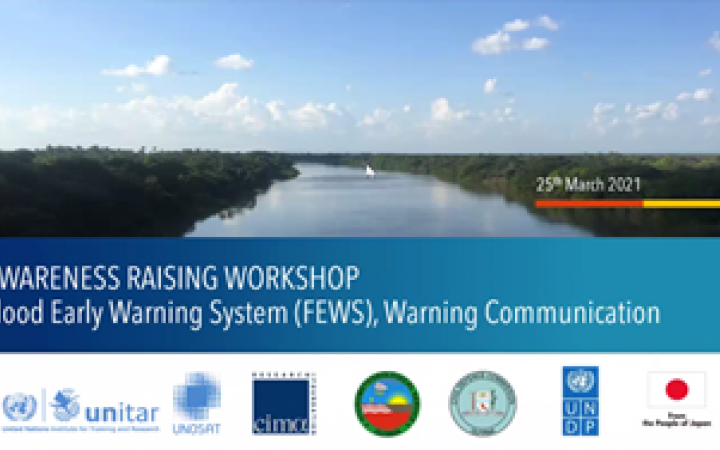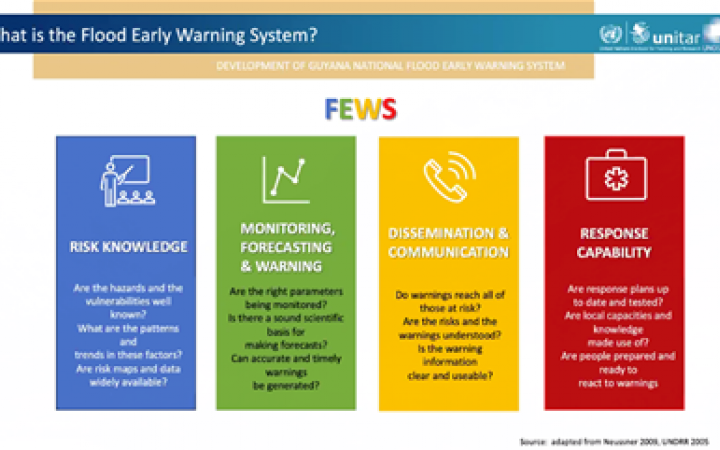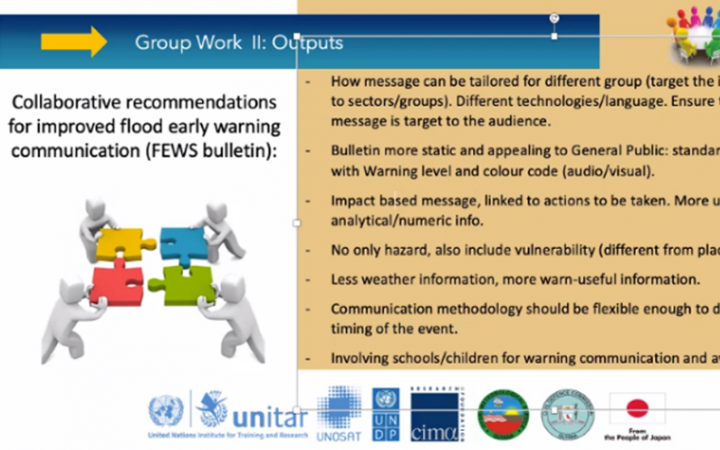" data-colorbox-gallery="gallery-image-7693-4QhYxTyHKQM" data-cbox-img-attrs="{" workshop was held via videoconference on march>

28 April 2021, Georgetown, Guyana - On 25 March 2021, UNITAR-UNOSAT hosted and co-facilitated together with UNDP Guyana and CIMA, an online Flood Early Warning System (FEWS) Awareness Raising Workshop with a focus on flood early warning communication.
From 2018 to 2021, UNOSAT in close collaboration with CIMA Research Foundation and UNDP Guyana have implemented a nation-wide flood forecasting system for extreme flood events in Guyana (GNFEWS) and FEWS related capacity development activities within the UNDP Guyana project "Strengthening Disaster Management Capacities of Women in the Cooperative Republic of Guyana and the Commonwealth of Dominica", generously funded by the Government of Japan.
Early Warning System (EWS) is a major component of disaster risk reduction. If successfully implemented, EWS saves lives, protects assets, resources and infrastructure but also promotes sustainable development.
The overall aim of this workshop was to raise awareness about flood forecasting and early warning concepts, policies, gaps and best practices among key stakeholders in Guyana. A need for enhanced early warning communication was identified during the collaborative stakeholders' workshop conducted in September 2019 in Guyana. Stakeholders informed implementing partners of the lack of focal points to relay information, delays in warning delivery, biased weather impact messages, lack of easily understandable language and insufficient urgency in messaging. During the awareness raising workshop currently being discussed on EWS practices and legislation in Guyana, Ms. Delisa Small from the Civil Defence Commission summarized the gaps as follows:
In addition to monitoring and forecasting, significant work and resources are needed to strengthen various elements of EWS for climatological hazards; understanding disaster risk, warning/dissemination, preparedness and response.
The workshop provided a forum to share achievements and communicate best practices, lessons learned and EWS tools in the Caribbean region, outline the flood early warning operational mechanism as well as national EWS frameworks, legislation, and current practices in Guyana with a specific focus on bolstering flood early warning communication across the spectrum from national to sub-national and local levels by identifying gaps and providing recommendations for improved communication, leveraging the functionalities of available flood forecasting tools and newly developed flood forecasting chain.
Forty four (44) participants with equal gender distribution joined the awareness raising workshop from 12 different institutions/entities, including several Neighborhood Democratic Councils (NDCs) at the community level, Regional Democratic Councils (RDCs) Guyana Livestock Development Authority, Civil Defence Commission, Hydrometeorological Service, Guyana Lands & Surveys Commission, National Agricultural Research & Extension Institute, National Drainage and Irrigation Authority and the Department of Environment and Climate Change.
The first part of the workshop provided participants with an overview of the Strengthening women's disaster management capacities project with a focus on activities related to the National Flood Forecasting System setup in Guyana. This part wrapped up with a presentation by the Caribbean Institute for Meteorology and Hydrology (CIMH) about flood forecasting practices and early warning communication and dissemination practices in the Caribbean region as well as the Dewetra platform used to visualize Guyana's flood forecasting results.
The second part of the workshop opened with a presentation by the Civil Defence Commission (CDC) about existing flood early warning frameworks, legislation, and practices in Guyana. A representative from the Hydrometeorological Service of Guyana (Hydromet) then presented current Flood Forecasting System (FFS) and flood early warning protocol. This part concluded with brief remarks by Ms. Seonaid Richmond, Vice-Chair of the Union- Naarstigheid NDC Neighborhood Democratic Council about early warning communication at the community level.
During the third part of the workshop, participants worked in groups to identify and summarize strengths, weaknesses and gaps within Flood Early Warning Systems (FEWS) in Guyana with a focus on flood warning communication but also recommendations for improvement based on available and future tools and capacities.
In order to collect feedback at the sub-national and local levels regarding current early warning communication weaknesses and recommendations for improvement, a pre-workshop survey was administered. The survey was conducted via the KoboToolbox application and via telephone given poor internet connectivity in certain areas of the country. The telephone interview was administered by UNDP Guyana with identified sub-national and local flood responders. A total of 10 questionnaires were completed.
Recommendations from workshop participants included tailoring messages for different target audiences, making mechanisms and protocols for early warning communication flexible enough to deal with the timing of the event, disseminating early warning information via different channels such as print media, television and radio, taking into account local vulnerability in addition to hazard risk, establishing an ad-hoc early warning communication working group to discuss and enhance coordination between different sectors and agencies and to improve early warning communication at the national, sub-national and community level, and many more.
The activities related to the workshop concluded with a report featuring findings, recommendations and a summary of participant feedback together with a draft concept of the flood early warning bulletin. The report was reviewed and approved by all workshop participants.








